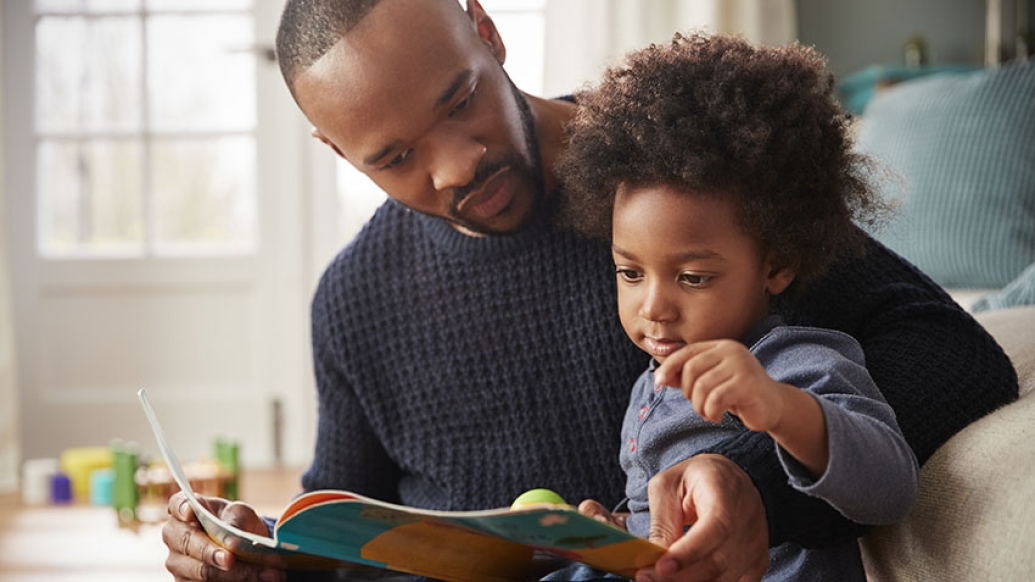New research finds that parents and children talk and interact less with electronic books compared to print books.
7:53 AM
Author |

Picking what book to read isn't the only choice families now make at story time – they must also decide between the print or electronic version.
But traditional print books may have an edge over e-books when it comes to quality time shared between parents and their children, a new study suggests.
LISTEN UP: Add the new Michigan Medicine News Break to your Alexa-enabled device, or subscribe to our daily audio updates on iTunes, Google Play and Stitcher.
The research, led by University of Michigan C.S. Mott Children's Hospital and involving 37 parent-toddler pairs, found that parents and children verbalized and interacted less with e-books than with print books. The findings appear in journal Pediatrics, which is published by the American Academy of Pediatrics.
"Shared reading promotes children's language development, literacy and bonding with parents. We wanted to learn how electronics might change this experience," says lead author Tiffany Munzer, M.D., a fellow in developmental behavioral pediatrics at Mott.
"We found that when parents and children read print books, they talked more frequently and the quality of their interactions were better."
The parent-toddler pairs in the study used three book formats: print books, basic electronic books on a tablet and enhanced e-books featuring additions like sound effects and animation. With e-books, not only did the pairs interact less but parents tended to talk less about the story and more about the technology itself. Sometimes this included instructions about the device, such as telling children not to push buttons or change the volume.
Story time plays an important role
Munzer notes that many of the interactions shared between parents and young children while reading may appear subtle but actually go a long way in promoting healthy child development.
For example, parents may point to a picture of an animal in the middle of a story and ask their child "what does a duck say?"
MORE FROM MICHIGAN: Sign up for our weekly newsletter
Or, parents may relate part of a story to something the child has experienced with comments like "Remember when we went to the beach?" Reading time also lends itself to open-ended questions, such as asking children what they thought of the book or characters.
Munzer says these practices, involving comments and questions that go beyond content, are believed to promote children's expressive language, engagement and literacy.
"Parents strengthen their children's ability to acquire knowledge by relating new content to their children's lived experiences," Munzer says. "Research tells us that parent-led conversations are? especially important for toddlers because they learn and retain new information better from in-person interactions than from digital media."
However, such practices occurred less frequently with electronic books, with parents asking fewer simple questions and commenting less about the storyline compared with print books.
The study suggests that electronic book enhancements were likely interfering with parents' ability to engage in conversation during reading.
Munzer adds that nonverbal interactions, including warmth, closeness and enthusiasm during reading time also create positive associations with reading that will likely stick with children as they get older.
Authors recommend that future studies examine specific aspects of tablet-book design that support parent-child interaction. Parents who do choose to read electronic books with toddlers should also consider engaging as they would with the print version and minimize focus on elements of the technology itself.
"Reading together is not only a cherished family ritual in many homes but one of the most important developmental activities parents can engage in with their children," says senior author Jenny Radesky, M.D., developmental behavioral pediatrician at Mott.
"Our findings suggest that print books elicit a higher quality parent-toddler reading experience compared with e-books. Pediatricians may wish to continue encouraging parents to read print books with their kids, especially for toddlers and young children who still need support from their parents to learn from any form of media."

Explore a variety of health care news & stories by visiting the Health Lab home page for more articles.

Department of Communication at Michigan Medicine
Want top health & research news weekly? Sign up for Health Lab’s newsletters today!





